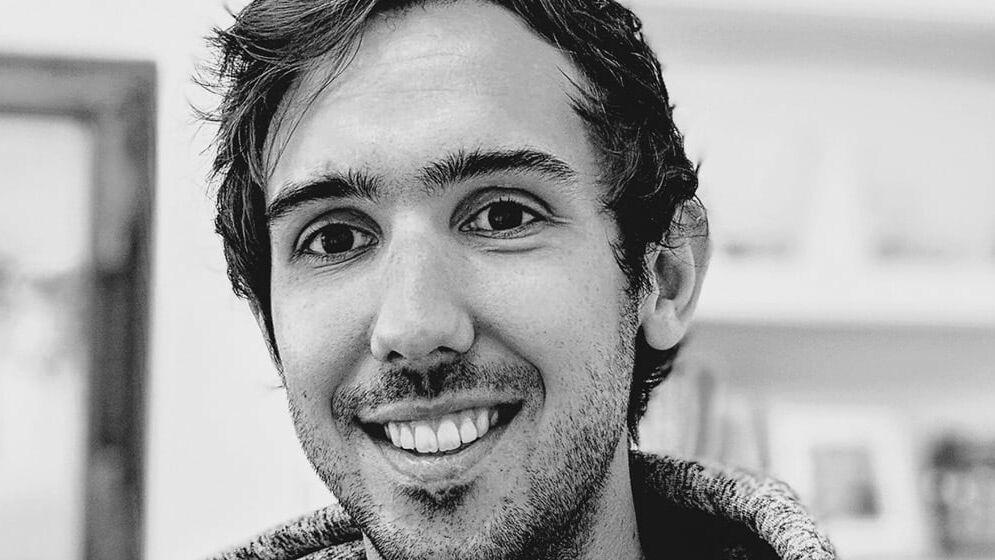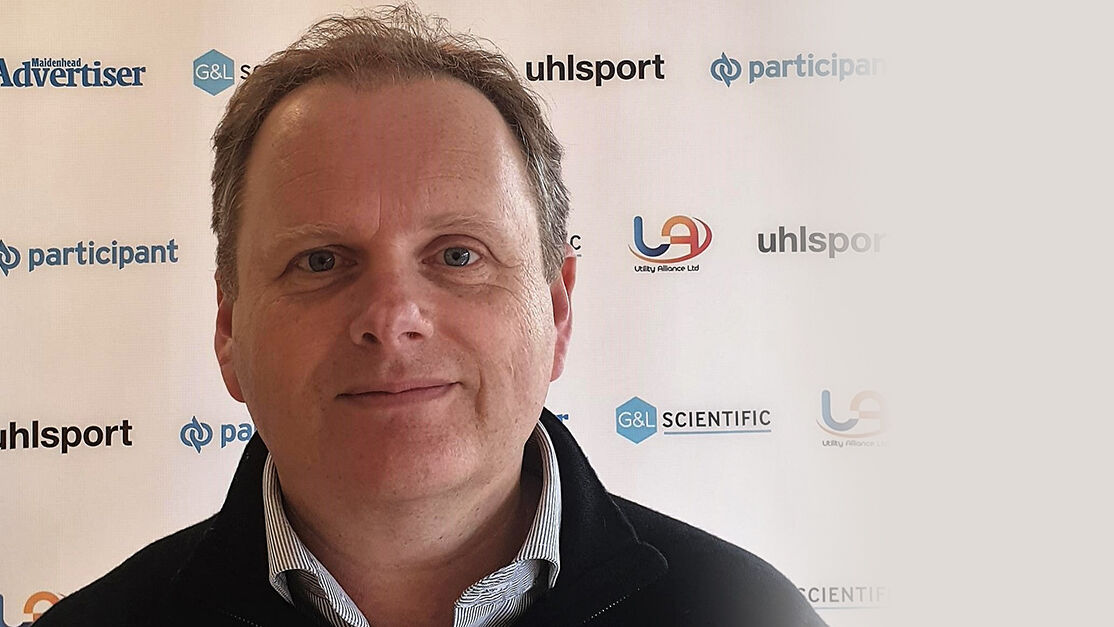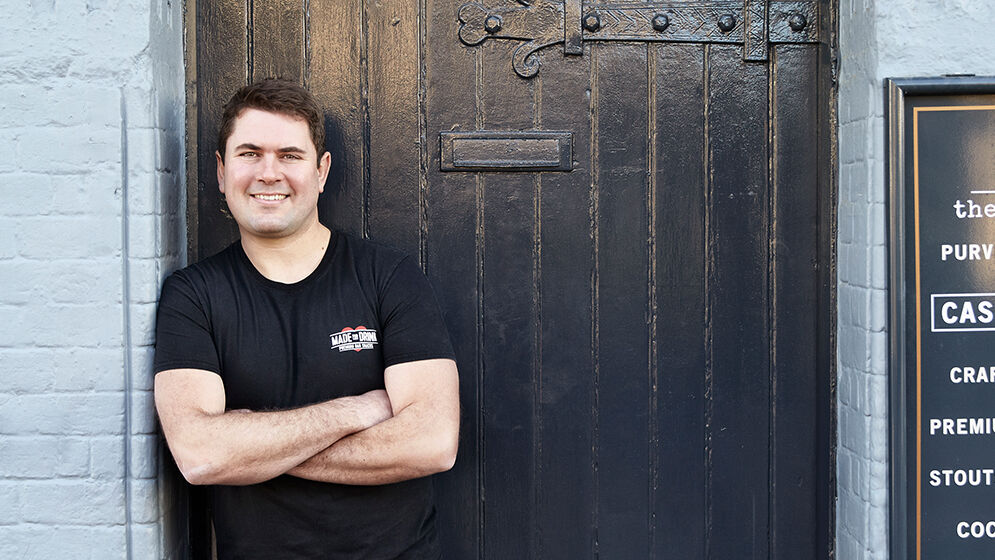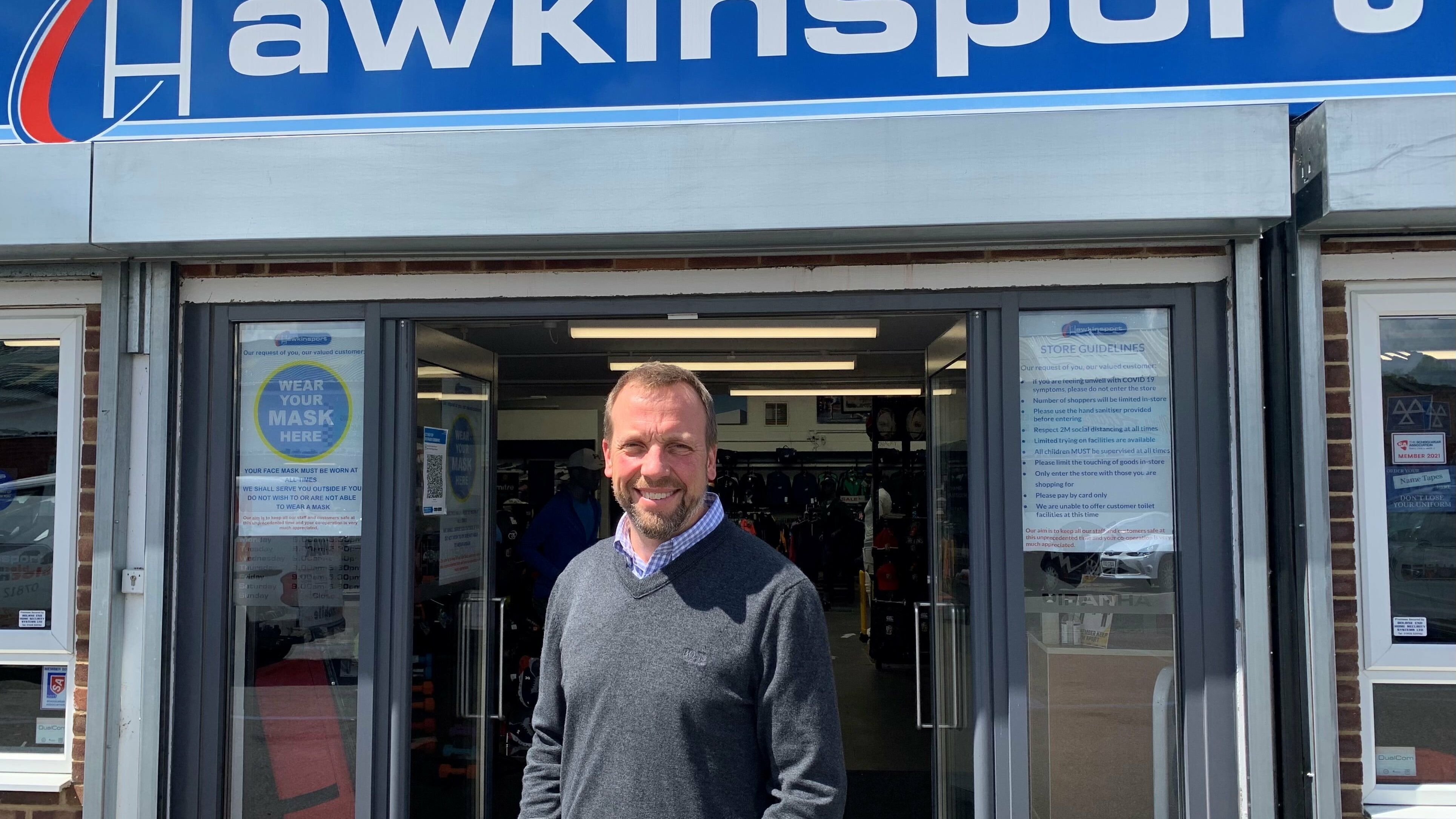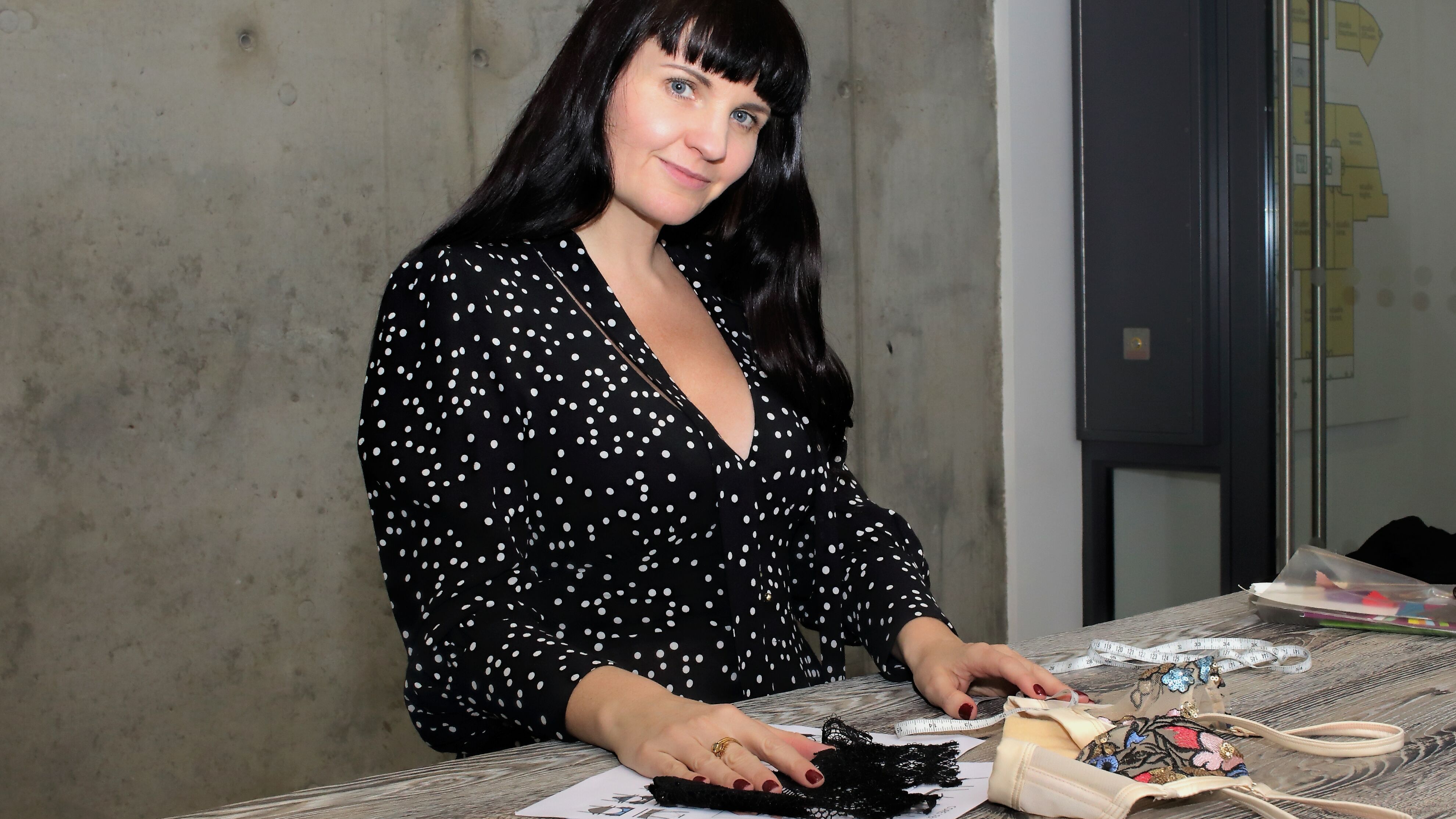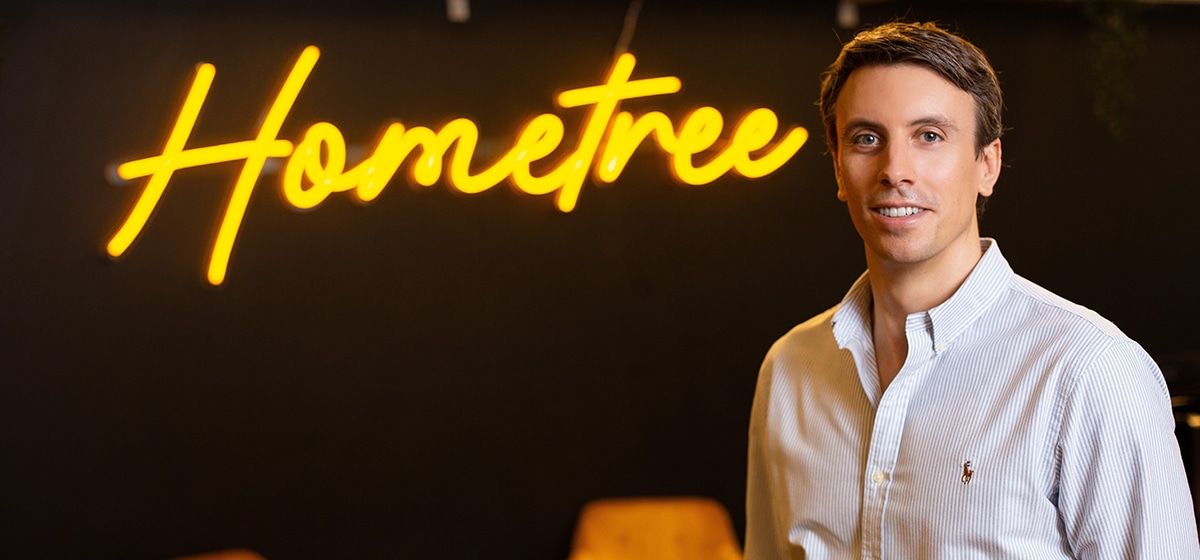
Succeeding as an entrepreneur, interview with Simon Phelan, Founder & CEO of Hometree
Simon Phelan studied Engineering and Mathematics at Trinity College Dublin, before moving to London to work as a management consultant. From a family of entrepreneurs, his underlying ambition was to start his own business, although he developed an early career in private equity before taking the leap.
Focusing on the huge UK utilities market and the growing trend of change, Simon recognised an opportunity but also the need for differentiation from other providers. As a technology-enabled home services company specialising in boiler and home emergency cover, Hometree challenges an outdated industry and aims to put the consumer first. The tech-enabled approach means that Hometree is able to offer an unprecedented experience, putting the control back into the hands of the consumer. In 2018, Simon was named by Forbes in a list of ’30 under 30′.
You come from a family of entrepreneurs – was getting experience in private equity part of a master plan?
That’s a timely point you reference around my family background because I actually spent eight months of 2021/2022 working with my father on selling his business to a big Irish conglomerate. At my recent wedding I also caught up with my dad’s brothers who are both entrepreneurs who I worked with for summers from the age of 10 and so now, with a bit more life experience and perspective, I do reflect on a childhood surrounded by entrepreneurship, which obviously shapes you and your perspective on building a career. I may not have known exactly what I wanted to do from a young age but I had business in my sights. My dad though thought I should do engineering – even though he’s a better engineer than I’ll ever be – but I spent my time working out the platform to get me from there into business.
When I left university, I had a vision of going to a McKinsey, Bain, BCG, do an MBA maybe Harvard or Stanford, do a couple years in private equity and then be ready for entrepreneurship! So in one sense there was a plan but the truth is I didn’t get an offer in 2010 in the depths of the global financial crisis and found myself in a position where I couldn’t make that step into consulting. I had an offer to do a masters in Cambridge and I had an offer for a Tier 2 consultancy firm in the infrastructure space called Turner and Townsend. Based on numerous factors I made the decision to take the gig that put me in London, with an opportunity to maybe go and re-interview for the McKinseys of this world later. Six months into that role, at 20 years of age, I was given an opportunity to jump ahead a couple of steps and work for Jon Moulton, one of the more famous PE investors in the UK, so while the original plan didn’t come to fruition something even more exciting came along!
Do you think the skills and relationships you developed there made a difference and what were the key learnings you took into setting up a challenger brand?
I think every experience is instructive in different ways and looking back, I was 20 years of age and given this amazing opportunity to work for someone like Jon who in one sense, I idolised. But I think to this day the best learnings were the soft skills – being able to sit in a room of people beside this guy who’s worth hundreds of millions of pounds and look in detail at how he works for 5-6 years, day in day out. It was very instructive – he was first in the office at 6.30 in the morning, he had an encyclopaedic knowledge and ability to digest information, he had daily routines with two PAs to cover the day’s emails and carve out time for different activities. His meeting style is straight down the line, no small talk and looking at my own career, you realise there’s someone who really understands the value of time! Although he was also very generous with time outside of the work environment – especially for someone like me who was hungry for insight and knowledge.
As a founder today I’m leading a technology enabled challenger brand and I see other founder friends of mine with background in tech-oriented businesses with a stronger product DNA than mine; their north star is to put themselves and the customer issues through a product or technology lens whereas the first six years of my career have framed problems through a corporate finance or financial modelling lens. While I’m not an accountant – I’ve done a corporate finance qualification – it’s more about the way I think about the world and growing a business through that private equity lens of go out, look at the industry, the players, the competitor offerings, the value chain, all the different forms of analysis. My background is in engineering and mathematics and I think the six years working in private equity honed those skills so I can quickly get a mental model in my head that gives enough headroom to be able to make decisions. In terms of hard skills, that had the biggest impact on my career. I’m not always the product expert but I add other things and bring in people who deeply understand the category and the customer pain points.
On to 2016 and having just turned 26, with a fantastic career in private equity, what was the opportunity for Hometree and why was it the right time?
Some entrepreneurs have an insight on a category or product and can’t get that out of their mind and just need to solve a problem for customers that they themselves may have encountered in their life and it becomes an obsession. The truth is, I didn’t come to the category in that sense – I never had a boiler breakdown or home services emergency and thought ‘God, this is a bad situation that it needs to be sorted’. I probably approached the problem more through the lens of an entrepreneurial bug and vision for who I wanted to be over time. I was agnostic around the category other than high growth and tech-enabled – the specifics were less important than the vision.
I was still working with Jon but had been very clear for several years that this is ultimately where I wanted to go and I was exploring ideas. He was very open and receptive to that and the idea actually came from an acquisition we completed in the UK home services space through the private equity fund (Jon still actually owns the brand Everest windows and conservatories and doors.) We did a deal in the home improvement space and I helped to look at the category and see what could potentially be bolted on to the traditional Everest offering. The existing model was primarily transactional one-off revenue but with a big customer base and a strong heritage brand. When we dug into the category it became clear that the attractive part of the value chain in home services was the recurring revenue insurance components such as home emergency cover. British Gas and HomeServe are the big players in the UK and in each market across the world there are a couple of big players. Ultimately this product protected against breakdowns to the critical infrastructure in consumers’ homes. It was a hundreds of millions of pounds profit pool in the UK alone, split between two or three immensely profitable players. It was 100% recurring revenue business with very high retention but I felt the incumbents were not investing in moving the service quality to match consumer expectations in a digitised world. I saw an opportunity for technology to drive a significantly enhanced service experience. They’d also fallen into the trap of perennial price hiking to drive profitability because customers need this peace of mind and so might switch between providers but tend not to leave the category. At least 8 million customers have this product and right now around a million and a half are looking for an alternative provider, mostly because they’re pissed off with British Gas or HomeServe for an unjustified price hike of 40% despite no claims, coupled with a pretty shoddy service.
I saw a business opportunity to build a challenger to these sleepy incumbents, at a time when lots of utilities like Bulb and Octopus were starting to try to do the same thing to British Gas in the energy supply business. I understood what they were doing but saw a big opportunity on the services side.
The other piece that really got me over the line was a trip to California to look at rooftop solar businesses and assess whether there was any opportunity to go into solar and other renewables. I became excited about decarbonising homes and a new type of services model to help the homeowner transition away from gas heating to a heat pump, put solar on the roof, install it, finance it and maintain it. So the vision for me wasn’t a bolt of lightning but something that built over a couple of years. It really was ‘Wow, if we enter this established category of home cover, build a challenger through technology and value proposition, steal share from big incumbents – that’s a valuable entity by itself. But if we use that platform to accelerate the transition to low carbon homes that’s a very appealing long-term vision!
So it grew out of exposure I had in the private equity fund and I got carried away with the opportunity and with more and more research, finally got to a point where I was willing to jump.
In terms of the timing, I was 25, in a great CEO role in Ireland, great car & salary – but it was a £30m PE business and focused on turnaround, so it was all about rationalisation. It wasn’t a dynamic ‘get in and grow it, do new things’ opportunity, it was go in and see how we can normalise working capital, renegotiate the lease on 150,000 square foot premises, take out some heads. It was functional stuff that was great learning and training but didn’t set my world on fire and ultimately, I just had the itch. Set against the ecosystem of the private equity world I was in it was a hard decision, but it felt like the right time.
And so returning to the question you asked earlier, ‘what did private equity give me?’, I talked about the hard and soft skills but the other thing it gave me was a day one network of capital providers and that was the game changer. Jon Moulton put in the 1st £100k and gave me a convertible loan note out the gate and that funded the business alongside me going without a salary which got us going for the first 18/20 months. It gave me an immediate step up and ongoing intros to pretty much any investor I wanted over the coming years which has been key to our success so far, although we’re still very much on that journey.
Hometree’s approach to transforming the industry epitomises a ‘challenger brand’. What challenges have you faced in the last 6 years and was COVID good or bad for you?
Our vision has never changed – to build an energy services business for the low carbon home. If you land on the Hometree site today, it still might look like a tech-enabled fresh challenger to a British Gas or HomeServe but in the fullness of time our aspiration is to expand the products and services we offer across a range of low carbon solutions for the home. What changes over time is the actual entry point and so when you look at our business today we are in a recurring revenue, high retention, high gross margin business. We’re still in investment mode because we grew almost 300% year on year last year and it’s all about scale for us. Our first model was different, a direct to consumer installation business, but we discovered that it is a hard business model to scale as its 100% transactional.
It was a steep learning curve and what I assumed was that first business would scale differently than it ultimately transpired. We grew that business to a north of £1m revenue per month, so scaled pretty quickly doing high hundreds of installations a month, but add exorbitant acquisition costs and ultimately the economics didn’t wash their face. The real benefit of having investment is that you’re being challenged on things like unit economics, which can only be a good thing. So despite pushing hard in the first 18 months or so, the hardest decision in the life of our business was 20 months in to pull up the handbrake and say you know what, we made a mistake! Installations will form part of our offering in time but we don’t want to put expensive venture capital money into acquiring what is ultimately local business where local tradespeople have an advantage winning share. Instead, let’s put it into scaling the more defensible and robust recurring revenue subscription business and as we scale, transition to a broader range of installation services for our big engaged customer base without spending the marketing money. It seems logical now and four years later it’s worked extremely well and we flew through COVID. One of the beauties of a high retention subscription model is assuming I grow more than I churn each month, my revenue line for the best part of 4.5 years is only going in one direction, very different to that transactional sales model.
There is a reason that private equity likes the AA, the RAC, HomeServe, British Gas services division – these high margin, high retention, consumer subscription businesses when scaled and working correctly are powerful business models because the economics work very well! So for us, the hardest challenge was finding the right business model to profitably scale and build genuine equity value.
You must have financially modelled the business to within inch of its life to get those investors on board?
When you have venture investors in the earlier stages, it’s important that they are flexible and have a leniency. But one of the things venture or any other investors don’t take well is when you tell them you have cash until next June and suddenly you’re coming to them in December with only three weeks’ cash! So we’ve tried to constantly look at cash. As Chief Executive I’ll go out and speak to the markets and investors to determine the story we need to tell the market in terms of growth rate in our potential profile. I’ll come in with a top-down view but we want the teams that are delivering – like marketing and operations – driving the input. It’s a very good discipline for us to build that budget and learn and reflect after each cycle.
How’s life on the other side of the fence and what would you tell your former self?
I should caveat that the type of investing that I was fortunate enough to be involved in with Jon was very different to the type of traditional venture capital that I raised today. In that world it was around cash flow and capital structure and maybe less work on the category and the product whereas – certainly in the earlier stages – it was the vision and the team and only latterly about the core fundamentals of business. But there are a couple of points that have been helpful for me in raising capital, understanding that these funds have a structure with analysts whose job is to speak to every company in the ecosystem, take details and put them into a CRM and having dealt with them enough, you realise that if you want to be raising money from venture capital, you need to be speaking to the partners who are ultimately going to be pushing that pen. Unfortunately there is a world where some of these guys act bigger than the boots they are in because they’ve not been company side and I think there can be frustrations. But I’m 6-7 years in and you can see someone will come in who is not an expert in the business and will ask questions as if they’re a 30-year veteran and it can leave a taste in the management team’s mouth.
Some of the best investors I’ve had have been 30/40 plus years’ experience and still they come in incredibly humble, not portraying that they’re the experts in your category. I think it’s an important lesson for people that if you’re fortunate enough to have an opportunity to get into an investing space early, have the humility to remember that operating is bloody hard. It’s easy to sit in a nice office in Mayfair, look at excel models and almost to commoditise different companies but executing and building stuff is hard and you need to have humility around entrepreneurs. The business’ executives are the tip of the spear of the of the ecosystem and there should be support because it can be a hard and lonely job.
I’ve also seen the power of networks of individuals like Jon Moulton. Also, fairly early into our life cycle we had a guy invest called Paul Pindar, ex-CEO of Capita, and he brought a bunch of investor colleagues along including Anthony Gutman, CEO Goldman Sachs Europe and Vin Murria, a big software investor. He also brought my current chair – Dawn Marriott who is the head partner on the operating side for HG Capital and I thought, this is great! It’s so interesting 5-6 years later seeing how that ecosystem that he brought into Hometree has been the network that he’s cultivated over 25/30 years. And I now go to events and see the same top people in Goldman Sachs and the like, and I’ve entered a community and I stop and think ‘Jesus how did I get here?’ but they’re all doing business among each other. Every year, I get invited to this Goldman entrepreneurs’ small annual dinner in London for 100 people up in the partners’ room and what I’ve seen is just the power of those networks. The same thing goes for Jon Moulton – still to this day, when I speak to him he will be talking about doing business with the same people that he was twelve years ago! I should have probably put more emphasis on the people that I was meeting in my early 20s as many of them may end up being the backbone of my business network for the next 30-40 years. It’s not about being slimy, dishing out and collecting business cards, rather about building deep relationships and even when you’re busy, it’s worth investing the time as you see how powerful these networks can be. I’d try and reinforce that to my younger self.
Having just doubled the size of the business with the acquisition of YourRepair, what’s next for Hometree?
We’re actively working on closing out some additional capital and I think we feel as a board, we’ve established a strong platform to go on and challenge HomeServe and British Gas over the next three years in the in the core home cover category. We’re now the number four player in the UK home services space so next we scale at pace. If you look at an analogous category in auto breakdown, you’ve got the two big beasts in the AA and the RAC but also Green Flag (owned by Direct Line) that has built 20% share over the last ten years. ‘What next?’ for Hometree is how can we scale up to 1-1.5m customers in a relatively short period of time both organically, by investing in our brand and direct customer acquisition, but also using the YourRepair deal as a template for rolling other providers in the category.
The second very important piece is where we are as a world. We’re in an extreme cost of living crisis, with the cost of gas sky high, putting homeowners in a pretty tough position. Hometree isn’t the primary solution but we have a role to play. It’s great the government has stepped in to support homeowners with their bills short term but that doesn’t go to the root cause. We need to transition away from heating our homes through natural gas, especially from Russia and other parts of the world, and one of the low hanging fruits is making our homes more energy efficient. So the second focus is how can we, over the next 12-18 months, with the right team and investment behind us, start the transition from a traditional home services business into one geared up to be a real winner in the transition to the electrification of heat, and of the home more generally.
So with those ambitions, what role will tech play in the business?
There’s a long-term love affair between VC and software, but we are now beginning to see investors understand the opportunity in digitising operations in other types of business.
So for us, what’s exciting about Hometree is a competitive landscape where British Gas has huge advantages given their brand but also huge liabilities given the legacy technology stack and being a super tanker that’s not easy to manoeuvre. Technology has really been at the core of our ‘how can we win versus a big established British Gas?’ and that’s not one single feature that we point to, it’s about the whole end to end journey, how we use technology. It starts with our technology stack and architecture – we built a scalable platform in the cloud in AWS, we built our own CRM called Pandora to offer a clear view on all customer engagement touchpoints and we’ve worked to digitalise every part of the customer experience. Aside of the day-to-day customer interface, the big differentiating investments for Hometree have been on the engineer and the claim side. We built our own dispatching engine for the work for engineers. By the end of our current financial year we’ll probably be hitting 100,000 customers with four and a half thousand engineers across the country and we need automation to get it right. When a customer makes a claim, we’ve built our software so that job can be auto-allocated to the right engineer based on multiple factors – quality of work, costs, proximity to the job etc. Over the last 18 months this has been transformative. 75% of our claims today take place without ever coming through a call centre – we digitise the claims experience. What does a customer want? To log a claim 24/7 really quickly. You wake up, no heating, no hot water. You want to know an engineer will be dispatched in real time. We’re managing fewer calls, the customer gets a better response, efficiencies – tech is a big help there.
We’ve also realised that around 10% of claims don’t need a call out so we’re using technology to offer a real time triage video call with engineers so customers receive advice but self-fix to get the quickest solution, with a professional to guide them.
We’re also building live feeds from the homes we’re protecting so if the customer’s got a smart thermostat or meter, we access that data and the fault code and understand in real time why a system has broken down, then despatch an engineer with the right parts. While it’s not a silver bullet, for us technology is the whole end to end journey.
Who has had the greatest influence on your career to date and why?
My family, Jon Molton and Paul Pindar would probably be the top three. My father built a very successful business, had an amazing exit, never raised a pound of capital over 45 years in business, put three kids through private education and gave the family everything we wanted in life. He was home by 5.30 every day for dinner but would be back to work in the office until 11/12pm every night. He didn’t have a formal education but grafted to build a great life for his family, driven by the need for independence. My father could have never worked for someone and I actually couldn’t either.
I’ve talked already about Jon Moulton and the impact he had on me – and of course Paul Pindar, together with my chair Dawn, who have taught me an awful lot.
What advice would you give to someone establishing a challenger brand?
Again, I caveat that we’re still a young business and while we’re on the way and have aspirations, I’m always cautious to dish out advice. But I would say there are different forms of entrepreneurs. If you’re product obsessed, own it – really understand how you differentiate against competitors but also bring in people who are good at the other parts of the business, raising capital, telling the story, building the business, finances etc.
Alternatively, look at someone like a Branson (who I’ve never met by the way) but who I would say is not a product founder but rather a business builder in multiple categories. I think that’s the category I would tag myself in. I would say, don’t just do the paper exercise. OK, I had a market opportunity that came to me but what took me longer is really getting under the hood and living and breathing the customer. You need to know where the opportunity exists and then hire in people who really understand the category. We hired the former Chief Commercial Officer & CFO of British Gas home cover 4 years ago who built the home cover business at British Gas over 20 plus years and who were steeped in the category. This gave us a new perspective on the customer opportunity. It’s great having a nice equity story about the challenger opportunity but the customer needs a reason to buy the product from you rather than British Gas. And you know British Gas aren’t stupid, they’re obviously a very capable business so you need to understand the category to differentiate effectively.
I would say to people: understand yourself, what type of entrepreneur you are and fill the gaps around you to make sure that you cover the business building side of the business but also the required capabilities and focus on the customer and how you can deliver something different.
How do you manage your work / life balance?
I’ve been very fortunate to meet a partner, Cristina, who had a very successful career in the advertising space for 12 years and has now joined TikTok and is running a very successful team there. We don’t have children yet, so having travelled a lot through my college years, I tend to err more towards work than play. That’s not to say I don’t have aspirations to travel more. My wife is Spanish and we’ve fallen in love with the north of Spain where she is from, but right now, it’s a core group of friends, most of whom I grew up with and live near me in London. They’re my backbone. I’m not an iron man but I also need to sweat every day in the gym or out for a run. I’m sure things will change if kids come along, aspirations might shift. COVID has presented a tremendous opportunity for my generation and I can see a scenario where I’m based in Northern Spain and commute to London when I’m not able to work remotely. And that’s completely acceptable! But I’m lucky, work gives me real meaning and purpose and so I don’t ever expect that I’ll be 9 to 5 because I love it too much!
Quick fire:
Beach or mountain?
Fine wine or cocktails?
Home working or office?
Fast car or luxury car? I don’t have a car!
Movies or books?
Currently reading a book called ‘The Founder’s Mentality’
Guide to selling your business
Your simple guide to helping you maximise the value in your business.
